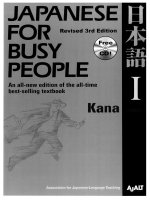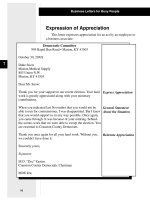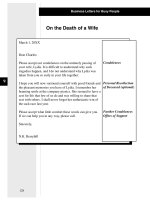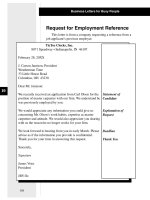JAPANESE FOR BUSY PEOPLE 4 pdf
Bạn đang xem bản rút gọn của tài liệu. Xem và tải ngay bản đầy đủ của tài liệu tại đây (3.11 MB, 30 trang )
4.
I
s
er07
la
14q
50/n\Tf,
L
i
t:
C
t-b
L
r.
5.
:ì32;r7.*~a>
yaa
*TIL~~
Y-ZT-+~~>.,
m
m
7
<
kt
2
+l
lC
is a form of request, but it would not be used when speaking to a supe-
rior. The meaning is "do (something) for (melus)."
ex.
#C7
<
kt
2
+l
L
'Won't you please come?"
Some other interrogatives of the same type as
tifi+
are
iijld',
+.
-
"something,"
i
\T
d.,
.l-
"sometime," and
Y*
Z
+,
"somewhere."
ex.
1.
tiktd.
E7
i
2
L
f:
73.,
'Was anyone watching?"
i.
2.
l:
i
73.
.f=i
5
t:
i
\T$,
"(I)
want to go to Kyoto sometime."
?xir
"Give me (any kind o0 cold drink."
2.
VZjCit
FF<
{
ZZt
Aij$To
li
i-
q
In
addition to the information given in Lesson 4, you should observe that
Z
Y
is a noun
meaning "thing," "happening," "experience" and the pattern
Z
Y
6
$5
1)
2
t
conveys
the idea "it sometimes happens that
. .
.
," "there arelhave been cases of
. . ."
ex.
1.
hR+li
t:i\7i\
%#,%T
6f-T-
$tdC.
VZ?
3T
%T<
Z
Y
6
%%*O.
LLO.L~L
ri
2to
"O
usually go to Osaka on the Shinkansen, but sometimes
(D
go by plane."
2.5eara
-fI+ra d\i\r%
-fa
ZY~
hl~t,
r
Li
0.
L:r
?t
"Saturday is a day off, but sometimes meetings are held."
"Japanese rniddle schools teach English to (their) students, but there are some
schools
which teach French."
Li
KEY
SENTENCES
1.
X
t
X5LIi
ABCT
7
dhzLT-It,
NOTES
75
-
1.
Mr.
Smith
is
a lawyer
who works for
ABC.
2.
Kyushu is
a
warm
region,
but
in
winter
it sometirnes snows.
CI
Vocabulary
vbldq
.i,?
it
snows
(lit.
"snow falls")
vbl
snow
.i.
a
faU
I
Noun-modifying patterns: Memorize the following sentences.
2.
$&*i\
Ad' f:Tka7
*&
Lt<O
L
3.
+-,T$
%771\6
Ffis
*-771\&Td\O
7
L;?
5.
5i)i
JRta'dx-t=
Ali
+$
Alf7
<
t3
i\o
7
C.
1.
dxhli &t<
2
dC
1
ATTO
3.
dbkdC
E
Ali
*v4
i.+k,~t~
+io<
I1
Make dialogues
by
changing the underlined parts as
in
the examples given.
A.
ex.
Q:
Z
hli
iiiTTTd.0
*L
A:
A$
;3.(
Y*?
CTTO
-L-
B.
ex.
Q:
TkLa41L.
~?,PI+
<
/;Ali
Y*)ZTTfi\o
Liiiri
C.
ex.
Q:
%M%
77
Ffi$
%77t\LaTfi'o
L
L.;.L
7
L;?
L
D.
ex.
Q:
&El
t\*ficL\\TTfi'o
i<.i=t,
E.
ex.
Q:
-
4
I
*i':
Ali i':&TTfi'o
.
DZ
3.
ai':
*7i\a-t-x,
F.
ex.
A:
ha)
Ali i':ktTItd\o
B:
h&, ha)
&d'h%
d\lf7i\6 ATItdbo
III
Practice the following pattern
by
changing the underlined parts as in the
example given.
ex.
#t
L
i':
dxO
78
EXERCISES
IV
Make dialogues by changing
the
underlined parts as in the example given.
ex.
Q:
~\3f
iYZ
i
$T
473
$-6fi\o
Lì
Vocabulary
lesson
lesson
(counter)
stranger
raise
he
irnplement, machine, appliance, t001
boiled egg
cut
toilet
heavy
carry, transport
bake, griil, roast
go
throughlpast
even (emphasis)
chat
marital disagreement
husband and wife
quarrel, fight
~PP~Y, propose
attend
attendance
wear, put on
(glasses)
cough
stand up
VOCABULARY
79
voice
laugh, smile
short
by oneself
oneseif
choose
(one's own) wife
promise, appointment
keep, obey
once
in
a while
Section Chief: Won't someone lend me a hand for a moment?
Watanabe: What is it (you want)?
Section Chief:
Do me the favor of putting away these papers.
Watanabe: Yes, certainly.
2.A:
X-~~-lZ
e+$*+<,
E77+$L~jd\~
I
i)'
B:
5zL-A%
E97+7<
t:5\\.,
A:
I'm going to the supermarket. Can
I
get you anything?
B:
Please get me some juice.
A:
What kind of juice do you want.
B:
One that's not too sweet.
LI
Vocabulary
%-E
section chief
n
$2
i
7%
lend a hand
+B
lend
80
SHORT DIALOGUES
4-
Li)&<
papers, docurnents
d\f:ilf
b
put away, tidy up
C
I
Read this lesson's Opening Dialogue and answer the following questions.
2.
3
i
Y+Za>
CCL
a
i:
i
AT-j-fi.,
L'E
3.
mii<x/ia
./3;.~/;.~~a,
raa
J
3!3T7t\g-j-fi\0
n.
r,
L
I1
Put the appropriate particles
in
the parentheses.
I11
Complete the sentences
with
the appropriate form of the verbs indicated.
i.
x
fi
(
Aia tf<$fi\o (~3
a-j-1
3.
'coi
x3i
F'$
(
)
Aia
+E
R7{ t:5ibo
?ti
(rzai-x,-ii.Lt:)
5.
5a>i
(
)
Ai:
+#-I%$
8-,7{t:5~\~
T
h'&
%
<
(*a
i-LT
L
t:)
6.
+E
( )
+@O)
+T
C&dc
-&
&dbi>f<TTo
Lf:)
?ti
:m
e*.
,'t,
I:L
t:*.
VI
Look at the picture and answer the questions.
2.
bjlifkas
dblf7t\6
Ali
f<&TTd\,
3.
5
%7~\6
Ali
f<ktT-kd\a
V
Answer the following questions.
82
QUIZ
q-
HIIIIIII
'
''&V**
ii-
7.
'i(&)
~l~l*l~l~l~~
(l2)
Kanji for recognition:
&W
35%
$0
I:
7h30
LESSON
m
THE
O-BON
FESTIVAL
;f;&
,.
-
Mr. Chang, who's thinking about a trip to Kyoto, asks
MI
Kato for
advice.
Chang:
Kato:
Chang:
Kato:
t
Chang:
Kato:
Chang:
Kato:
Around August
10,
I think I'd like to take a (pleasure) trip to Kyoto. Which is more
convenient, the Shinkansen or a plane?
I reckon
the Shinkansen is more convenient. But then I'm afraid there aren't any
more Shinkansen reserved tickets. Plane tickets are probably sold out, too.
Why is that?
The O-Bon
Festiva1 is around the middle of August. There are hordes of people
returning to their home towns. This homecorning rush begins around the tenth. It'd
be
best to give up your trip.
I
heard Suzuki's going back to his home in Kyoto on the tenth, too.
Um.
He
said he bought a ticket a month early.
1s that so? How long does it take to Kyoto by car?
I guess it'd take more than ten hours.
Suzuki went by car last year and he said the
congestion was terrible.
Chang:
It's because Japan has a lot of people and cars, wouldn't you say? I'd hke to go some
place where it's not crowded.
Kato: There is a place without crowds.
-
Chang: Where's that?
Kato:
Where do you think it is? It's Tokyo around O-Bon.
Chang: I see.
Ci
Vocabulary
think
reserved ticket
appointment, designation,
specification
ticket
anylno more, any/no longer
sold out
around the
middle
O-Bon (midsummer festiva11
home town, birthplace, country
hordesllots of people
homecoming
rush
give up, stop
house,
home
more than
h)
fi
-
es-h
congestion, traffic jam
P
many, much
I
see, it's reasonable
:ed rnater
bis
Y
L
t:,
(He said)
.
.
.
Y
<
$
obviously signals quot
,ial. It should be note8 that when a third per-
son's statement is cited, the verl
:
$-,-T\\&
Lt:or
Y
$77\\&-#
ex.
+%.*Lli
l
t: $77\\& Ltz0
IiCL
+iiZ
i.
"Hayashi said that he wanted to go to Kyoto."
If the emphasis is on the action of saying, the verb
S
i
is used in the same way as other
verbs,
e.g.,
%$21
L
li
tzikl:
Si
\
2
L
7':
d\,
"Whom did
Mr.
Suzuki
say (it) to?"
L
t:
is found
in
story-telling style, written or verbal. See Book
III,
Lesson
12.
A verb tense form
in
quoted material has no relation to the tense form of the verb end-
ing the
sentente,
so it may be the same or it may be different. It is also quite cornrnon
for negation to be expressed
in
the first, rather than the main verb, and this sometimes
contrasts
with the pattern in English, as in
2
2
21
IL
li
;k>
L
t:
-72~
\
Y
,E\
\
2
6
t
It,
if
this is translated, "I don't think Srnith is coming tomorrow."
When the subject is the speaker or the listener in interrogative sentences,
.
.
.
Y
$
6
6
is the recornrnended form to use.
If
the subject is
a
third person,
. .
.
Y
W
7
7
i
\
b
is
6
L
used exclusively.
As
in
the examples above, verbs, adjectives, and
TIt
after nouns corning at the end of
quoted material are in
plain forms, as shown in the chart below.
Plain forms
which precede
Y
&
1
Y
$i
\
3
T.
Verbs
Adjectives,
Noun
+
T*
Reg. I
Reg.
11
Irr.
Present Past
1
GRAMMAR
&
LESSON
OBJECTiVES
87
,
Present
i\adj.
aff.
i%
i
3
1).
i\&
&a
-fa
Past
neg.
l%.htìL\
3
0'
\\+i-\
1
\
La\\
aff.
4%
7
t:
7
*.
I
\t:
$
t:
L
t:
aff.
neg.
@bia'4",
t:
7
0'
i\t671\7
t:
4~72d>~
t:
L
7271.7
t:
neg.
%<
Q\\
h*
aff.
*d\7
t:
h*
neg.
$7
<
Qd.7
t:
h
n.
*TLai
VZ
i
30) 3.
t:.;:L
$?l)
3fiTL
1:
io
1
m
T
L
r
i
,
seen in Lessons
2
and
3
as a way to soften a direct question, may indicate con-
jecture or probability, or what the speaker believes to be true. Words coming before
T
L
r
i
are
in
a plain forrn and in the case of
td'
adjectives,
T
L
1:
i
comes directly after
the stem, just as it directly foilows nouns.
ex.
l.
$0)
L
T
:i
ALli 3d'TLt
i
L
-I
"That park is probably quiet."
2.
d.fiii 4L:LT-f- d.fiii KLCLTL
1:
i
"HeJsalawyer,Isuppose."
3.
+t>?Lia
t
I
SL-T~\'~~\\TLL
io
Il
'i
"Chang probably hasn't told Ogawa yet."
For fdler connective pattems, see Appendk
A.
Since it irnplies tentativeness,
T
L
1:
i
would sound awkward or irresponsible
if
it
referred to the speaker's own action.
ex.
Z:Z-'rLli hLt:
ARI:
4T<TL1:io
t;%<$'
However,
&
%T
<
T
L
1:
i
is awkward.
1.
%
&
(~he O-Bon Festival)
IrL
For this festiva1 on August
13-15
(there are a few local variations on the dates), many
companies close down and
rnillions of people desert the big cities. Originating in Bud-
dhist beliefs fused with folk traditions, it celebrates the return of ancestral spirits to
their birthplaces for a three-day visit and is, together with the New Year's holidays, a
major event among the
literally hundreds of annua1 festivals. Secularized to some
extent in recent
times, O-Bon is an occasion for family reunions, and the highlights are
the
Bon Odori,
"Bon Dance,"
O-haka-mairi,
"visits to (ancestral) graves," and the
lighting of
fires and lantems to welcome and send off the spirits of the dead.
The usage of
t
i
,
"aiready,"
t
i
'ts
l,
"not any morellonger," and
t:,
"yet, still,"
need not be confusing. Study the following examples.
ex.1.
Q:
2
i'
1
7
.;:li
$5
'I
2 Td.,
"DO (you) still have tickets?"
Aa:
li
\
,
2
ti'
$5
li
a
T,
"Yes, there are still (some available)."
An:
t
t
A
t
i
h
1)
-2
-ti
Lo
"No, there aren't any more."
2.
Q:
d.fi
ii
t
i
&
da.[? 2 L
t:
"Has he gòne out already?"
Aa:
i
.
4
i
&
dd.
If
2 L
t:.
"Yes, he's aiready gone out."
T
An:
\\\\A, &ti &d~lf-T\\&-t?L, 2t:
$1:
\\$To
T
%'i
"No, he hasn't left yet. HeJs still at home."
88
NOTES
i-
As shown
in
Book
I
(p.
841,
d
i
can also mean sirnply "more," i.e.,
6
i
1
2
I
\
'4
9
.
%
<
t:
5
t
\
"Give me one more ticket, please."
3.
Y-Z f-'Y ,si\&-6fi~o
t;
L
Expressions similar to this one are:
1.
Q-tf
Y
,CI
\
\
2
-6
fi.,
'Why
is
it,
do you think?"
t;
L
2.
t<
kt
fi.'
f
i
%
9
f:
Y
,%
i
\
2
-6
rlbO
"(Cad you guess who said so?"
t;
t
Ci
KEY
SENTENCES
1.
There's a strike tomorrow, so
I
expect trains
and
buses won't
be
&g.
2.
Kimura said he knows Sapporo.
3.
Tomorrow will probably be rain(y).
Ci
Vocabulary
strike
m,
rnove, operate
f:.ì:X,
probably, perhaps
T%
rain
hh
Make dialogues by changing the underlined parts as in the examples given.
EXERCISES
89
C.
ex.
Q:
E3*5LI.i
fi
'RiJ&Ltz13\o
6.'
1.
L@i13\t\ii
ti
%2ii2Lfz
li
L
2.
L
z0
-
t
i
M32Lf:
3.
Efle5Lia
I
ti
&t\aLf:
b>
4.
RRLiIaiia
ti
2r2I,&Lt:
ltL?ni
D.
ex.
Q:
ta'3.Mikl:
m%
Ct
0
1:
L 2-4-13.,
A:
jksig-
$l+?y.1:
fT+t:t\z
lgt\&-j-o
li7
O
i>
L
7
l.
%
t:
<
5
L
%C
IiL
.t
2.
2%
si
'A
b
3.
ICb0
+Ah%
3-6
7
S'
4.
ttfli0
f
?niLni
rt
E.
ex.
Q:
$50
A0
I:;t'Laa>
$6
Ffi%
%77,\&-4-13\0
DL
LZl,
A:
I$t\5-30 ZQ')t<Y l%t\2-4-o
90
EXERCISES
h-
F.
ex.
Q:
M5XIii
Y
%-,Tt\2Lf:fi\,
<-T
I.
'i
L
3.
XEX,
siLk fj\t\$+l: &f:<Qt\~-f
T
4.
&E,
sia
'i
XS-YS
Ta
ermC
si
li
Pi
t:
C
*L
G.
ex.
Q:
siLf:a>
i
Y"iTL
a
id.,
?L
1
LI
Vocabulary
bo&
A/
'
research
""4
necessary
prime minister
gathering, assembly
minister
(of state)
client, guest, visitor
research, study
be brought together, be
in
order
VOCABULARY
91
-I*
t
swimrning
care, trirnming, mending
next, neighboring
graduate
graduation
result
nurse
musical
attend
PI~Y
suitable,
appropriate
Brown:
Where are Shinkansen reserved seat tickets sold?
Passerby: (They're) sold at the Green (Ticket) Window over there.
Brown:
I'd like two adult tickets and one child's to Kyoto.
A:
What (number) track does the 10:30 express going to Nagano depart from?
B:
It's track number eight.
-l
92
SHORT
DIALOGUES
CI
Vocabulary
Se?
sea t
-?Z?&
passerby
A
Y-
1)
0
2
Y*O
Green (Ticket) Widow (for reserved seat and express tickets)
(-6
A
Y.'
'I
green
a
YÙ
window, clerk
<-
5
kA
adult
tj
r
'i
-e
li?
departure
*R
Q*<
o,
Nagano (city)
-47
?
bound
for
-,n?
special/limted express
-%W!
(counter for tracks)
IiLaL
I
Read this lesson's Opening Dialogue and answer the following questions.
i.
I
san
ioazi;
~'z-
AzF
%TCf<t\r
6<7
6'
t
%
1'C-77i\a
t$\,
fi
L
2.
&&n
zF,ti
Y"i
L7
.8-<
Ozi??
%#@n
? i:
IiL
li?
LL+LILL
$
551)
CkclC
'21)
$*$\O
QUIZ
93
,
I1
Put the appropriate particles in the parentheses.
IIi
Complete the questions so that they fit the answers. (Use a question word.)
IV
Complete the sentences with the appropriate form of the verbs indicated.
%
94
QUIZ
V
Answer the following questions.
NEW
KANJI
95
-a
PREP
SCHOOL
L
-
-
.l
*
w/;<c:-
S
e%
oì
M
O-(
p~se
q-\pev
When going to the Tanakas' house, Mr. Johnson meets their
daughter, Keiko, on her
way
out.
T
("TT1i.o
C,
2
z'&hfd5i'o
+H*Iz
~V;'%I,
q
L%&%
5ii
Cni
:
i
ti
:
LQifktIf Q')
atih1i.hO
At the
prep
school.
Keiko: Oh, Mr. Johnson.
Johnson:
Ah,
Keiko, are you going out?
Keiko: Yes,
I
have to (go out).
Johnson: (Do you have to leave) right now?
Keiko:
Sorry, (yes).
I
have to register at a prep school today.
Johnson: Prep school?
Keiko: Yes.
I
didn't pass the exam for the university
I
wanted to attend, so
I'il
take the
exams again next year.
Johnson: Well, well. Good-bye.
Keiko: Bye-bye.
Keiko:
Are (my) application papers al1 right (like) this? This is the entrance fee and (here's)
three months' tuition.
I
think
I'd
like to register for the sumrner course, too. Can't
I
register later by mail?
Clerk:
Yes, mai1 is OK. As for payment, you don't have to go to the trouble of coming
(al1
the way) here. Please transfer (it) to our bank.
Keiko: 1s sending it by registered-cash mai1 ail right?
Clerk: Yes, either
will
be fine.
D
Vocabulary
female given name
Oh!
(women's speech)
must
I'm sorry, Excuse me
preparatory
school
pass (an examination), succeed
success,
eligibility
z%
take (an examination), receive, undergo, have
good-bye
good-bye
entrance/matriculation fee
matriculation
3
months' (worth)
portion, share
tuition
instruction, Iesson
fee, charge
summer course
later, aftenvard
mai1
must not
is
al1 right
payment
go to the trouble of
especially
don't
have to
transfer
registered
mai1 (for cash)
registered mai1
either
fine



![japanese for busy people 2 [kana version]](https://media.store123doc.com/images/document/14/rc/my/medium_mye1395897198.jpg)





